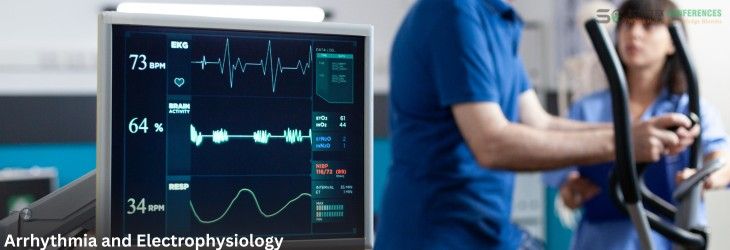Track: Arrhythmias and Electrophysiology

An Arrhythmia, often known as an irregular heartbeat, is an issue with your heart's pace or rhythm. It means your heart is beating too fast, too slowly, or in an uneven manner. Most arrhythmias are harmless, but some are dangerous or even fatal. When the heartbeat is too fast, too slow, or irregular, the heart is unable to pump enough blood to the body.
Types of Arrhythmias:
- Atrial Fibrillation (AFib): Characterized by rapid and irregular beating of the atria, increasing the risk of stroke and heart failure.
- Ventricular Tachycardia (VT): A fast, abnormal heartbeat originating from the ventricles, which can lead to severe symptoms or sudden cardiac arrest.
- Bradycardia: Abnormally slow heart rate that can result in dizziness, fatigue, and, in severe cases, heart block.
- Premature Ventricular Contractions (PVCs): Extra, abnormal heartbeats originating in the ventricles, often felt as palpitations.
Cardiac electrophysiology is a specialist subject that studies the electrical system of the heart as well as the detection and treatment of arrhythmias, which are irregular heart beats. This discipline combines advanced diagnostics like electrocardiography (ECG), intracardiac mapping, and electrophysiological research with cutting-edge therapies like catheter ablation and device implantation (pacemakers, implantable cardioverter defibrillators). The expanding understanding of the heart's electrical activity, combined with advancements such as 3D mapping, AI-assisted rhythm analysis, and non-invasive ablation technologies, is transforming the arrhythmia management landscape and improving patient outcomes.
Primary Focus Areas:
- Heart Rhythm
- Anti-Arrhythmic Drug Therapy
- Management of Atrial Fibrillation
- Electrolyte Imbalances
- Preventing Complications and Treatment Options
- Genetic Arrhythmia Syndromes
- Catheter Ablation Techniques
- Role of Lifestyle Changes in Arrhythmia Management
- Innovations in Arrhythmia Treatment
- Arrhythmia Risk Stratification
- Pharmacological Management of Arrhythmias
- Use of Wearable Technology in Arrhythmia Detection
Scientific Highlights
- Cardiovascular Diseases
- Cardio Oncology
- Pediatric Cardiology & Congenital Heart Diseases
- Thoracic and Cardiovascular Surgery
- Hypertension and Cardiac Regeneration
- Interventional Cardiology and Cardiac Imaging
- Women and Fetal Cardiology
- Diabetes, Obesity and Stroke
- Vascular Surgery and Vascular Biology
- Molecular and Geriatric Cardiology
- Cardiac Nursing and Critical Care Cardiology
- Arrhythmias and Electrophysiology
- Cardiovascular Pharmacology and Toxicology
- Cardiac Immunology and Bleeding Disorders
- Heart Devices
- Heart Diagnosis and Transplantation
- Cardiovascular Impact of COVID 19
- Preventive Cardiology and Lipidology
- Cardiomyopathies and Heart Failure
- Current Research in Heart & Cardiovascular Disease
- Cardiovascular Anaesthesiology and Endocrinology
- Case Reports on Clinical Cardiology
- Internal and Emergency Medicine


